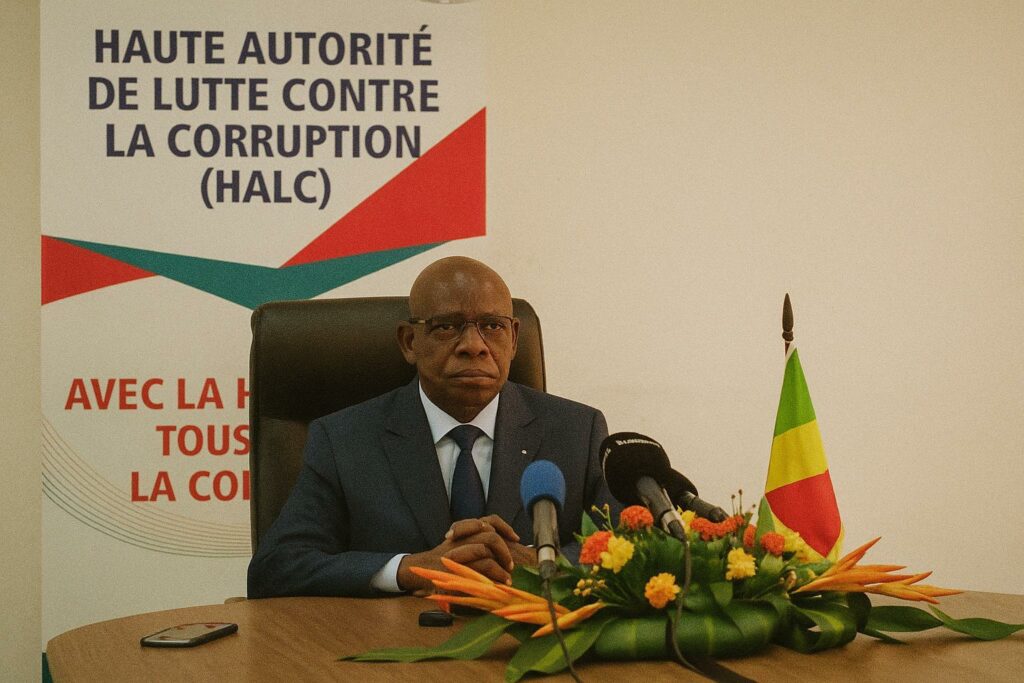Congo’s Ethical Turn on the African Stage
In Brazzaville, beneath the discreet chandeliers of the Haute Autorité de Lutte contre la Corruption, Emmanuel Ollita Ondongo invoked an unexpectedly intimate notion: the right to dignity. The occasion was the ninth African Anti-Corruption Day, a moment that increasingly resembles a continental stock-taking exercise. Against a backdrop of cautious optimism, the HALC president argued that corruption, far from being a purely financial offence, corrodes the ability of citizens—particularly society’s most vulnerable—to participate meaningfully in civic life. Observers recalled that the African Union’s Convention on Preventing and Combating Corruption defines the vice not only as a deviation from lawful conduct but as an infringement on human security itself. By foregrounding dignity, Brazzaville’s leadership signalled that its anti-corruption programme is converging with normative currents flowing from Addis Ababa to New York.
A Commitment Echoing Continental Norms
The thematic choice aligns neatly with the African Union Advisory Board on Corruption’s 2022 assessment that human-centred approaches can deepen public confidence in state institutions. Ollita Ondongo’s pledge to liaise systematically with human-rights actors echoes provisions of the United Nations Convention against Corruption, ratified by the Republic of Congo in 2006, which urges States Parties to integrate anti-graft measures within broader human-development strategies. Regional diplomats noted that Brazzaville has already transposed several of these obligations into domestic law, including a 2019 statute granting the HALC investigative autonomy and safeguard clauses for whistle-blowers. Legal scholars such as Professor Armand Tchicaya of Marien-Ngouabi University argue that such provisions widen the scope for judicial cooperation with bodies like the Central African Financial Intelligence Unit, nurturing what he calls “a shared grammar of probity”.
Dignity as a Compass for Governance
Positioning dignity at the centre of the campaign reframes corruption as a daily violation rather than an abstract misallocation of funds. In the health sector, petty bribery can delay maternal care; in education it may determine whose child advances to secondary school. By underlining these lived realities, the HALC seeks to translate legal reforms into tangible protections. International development partners, including UNDP, have welcomed this rhetorical shift, contending that it opens space for targeted social-protection schemes. Within government, the Ministry of Social Affairs has begun piloting workshops for local administrators on how procurement transparency intersects with the right to basic services. Such initiatives illustrate a strategic pivot: fighting corruption is no longer just a fiscal imperative; it is a moral undertaking embedded in the nation’s development blueprint, Congo Vision 2025.
Measuring Progress Beyond Indices
The Republic of Congo’s ascent from 165th to 151st place in the latest Transparency International Corruption Perceptions Index provides a convenient headline. Yet Ollita Ondongo was careful to caution against complacency, framing the 14-position rise as a “working proof of concept rather than a victory lap.” Regional economists observe that the CPI, while influential, captures perceived rather than experienced corruption. Afrobarometer’s most recent survey indicates that 47 % of Congolese citizens still view certain public services as vulnerable to informal payments. HALC officials insist that such data are being folded into a new national observatory that will combine perception surveys, judicial statistics and sectoral audits. The ambition is to produce a composite indicator capable of guiding policy adjustments in real time—an approach consistent with the OECD’s call for evidence-based anti-corruption governance.
Synergies with Civil Society and International Partners
At the operational level, the authority is intensifying its partnership model. Civil-society organisations such as the Congolese Observatory of Human Rights have been invited to co-design awareness campaigns in remote districts where mobile-network coverage is limited. Meanwhile, the toll-free number 1023 continues to expand its footprint, recording a 32 % uptick in calls during the first half of 2023, according to internal HALC data. Diplomatic missions in Brazzaville, notably from the European Union and the United States, have expressed interest in supporting forensic-accounting training for magistrates, reflecting a wider international consensus that capacity building is integral to sustainable reform. The African Development Bank’s Governance Diagnostic, published last year, similarly applauds the country’s emphasis on prevention, arguing that it complements ongoing macro-fiscal consolidation efforts under discussion with the IMF.
Outlook for a Preventive Culture
Looking ahead, the challenge lies in embedding a preventive ethos across governance layers. The Prime Minister’s Office is reportedly crafting a directive that will require ministries to conduct annual integrity risk assessments, with findings made public. Such transparency can fortify investor confidence at a time when Congo is courting green-energy partnerships along the Sangha River corridor. Diplomats interviewed in Brazzaville suggest that a demonstrable link between anti-corruption diligence and development dividends could amplify the country’s negotiating leverage within the Central African Economic and Monetary Community. Emmanuel Ollita Ondongo, for his part, remains convinced that citizens are ready to act as co-custodians of public ethics, provided they feel shielded from retaliation. His insistence on human dignity as both a principle and a policy tool may therefore be more than rhetorical flourish; it could signify the emergence of a civic contract where integrity underwrites national progress.

